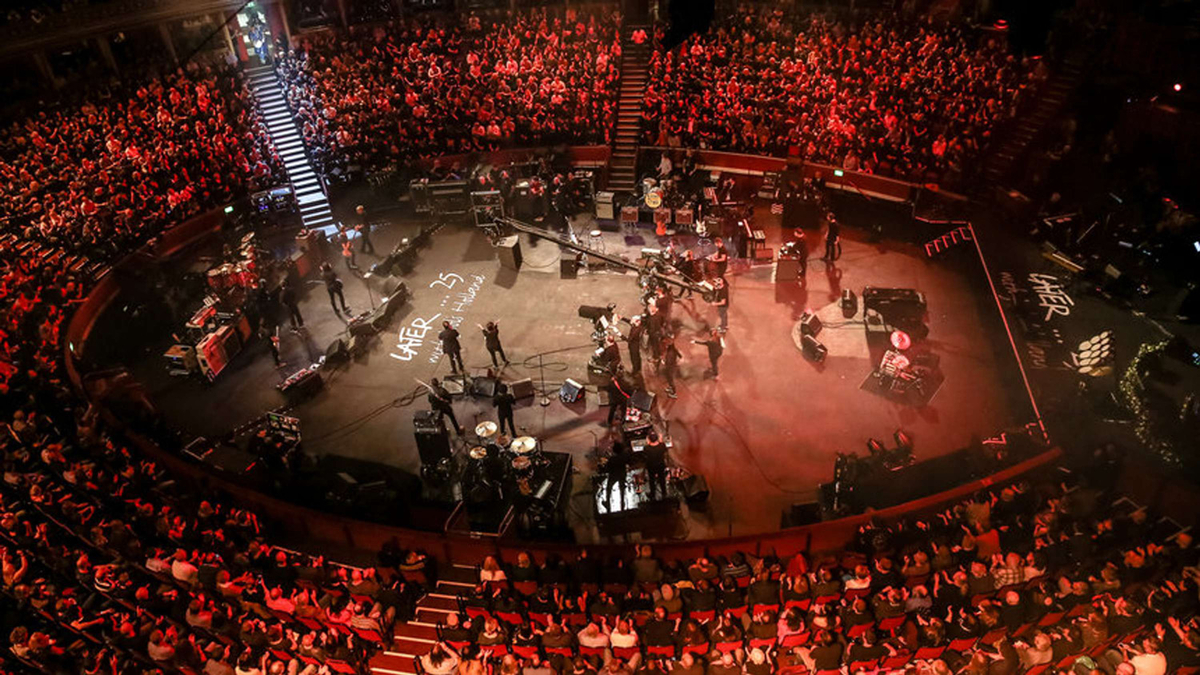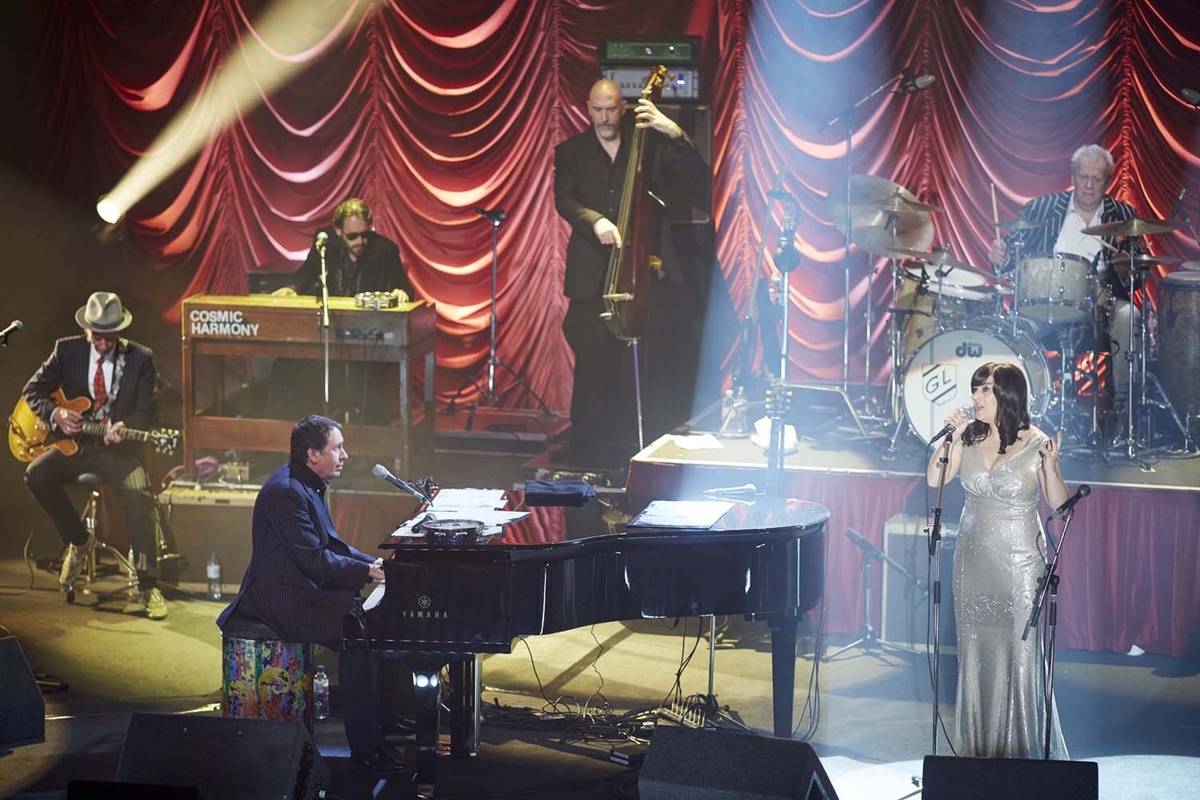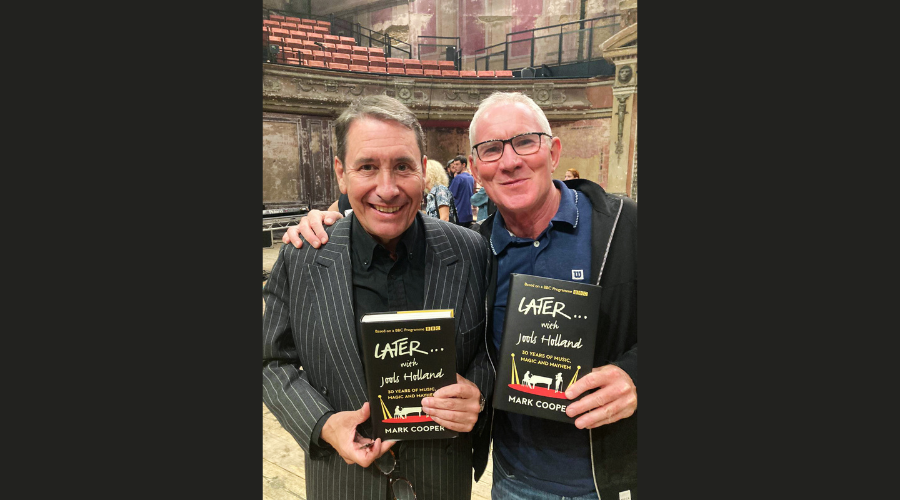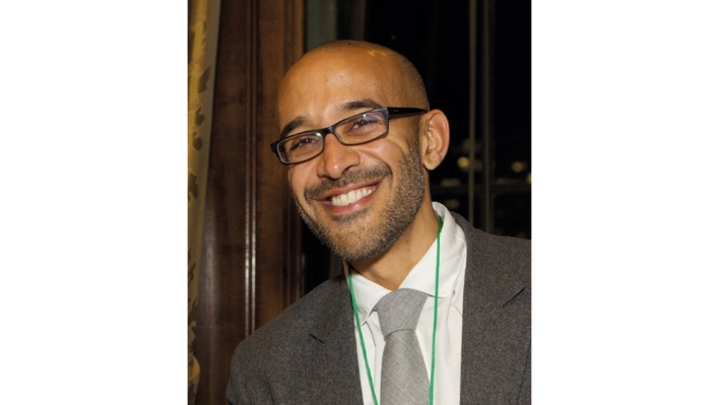For 26 years, Mark Cooper attended every single recording of Later… with Jools Holland and its spin-off New Year’s Eve show, Jools’ Annual Hootenanny.
The only time he nearly missed one was when he was holidaying with his family in Portugal. But, much to his wife’s annoyance, he flew back to be in the studio before returning to the beach once his work was done.
“I’m a sad bastard,” he reflects. “There’s a point you get to when you’ve done so many that the idea of missing one would be heartbreaking and numerically sad.”
Now, after leaving his job as head of music television, BBC Studios, where he led BBC TV’s coverage of Glastonbury and executive produced more than 250 music documentaries, Cooper has written a book, Later… with Jools Holland: 30 Years of Music, Magic and Mayhem. It takes us behind the screen from the beginnings of Later… as a segment in BBC Two’s arts and media showcase The Late Show, to its latest incarnation, which is recorded in its new home at Alexandra Palace.
Reading the book, one learns right away that Cooper is a man who has lived his life immersed in music. He is equally at home writing about Johnny Cash as he is about Jay-Z or a more left-field performer such as Oumou Sangaré, the Grammy-award winning Malian singer and composer.
Of course, this eclecticism is what has made Later… what it is, less a TV show than a BBC institution, a place where music legends such as Van Morrison can hang out in the same studio as a new artist who has still to make their first recording. Icon or newbie, the performer is likely to receive the same welcoming patter from Jools Holland, whose mix of nonchalance and enthusiasm puts even the biggest egos at ease.
To what, then, does Cooper ascribe Later’s longevity? “The secret of the show is its aesthetic. It found – and finds – a way to bring out the best in musicians on TV.
“It doesn’t try to be too cool for school and isn’t a trend show or a generational show and isn’t aimed at a particular demographic.
“In some ways, it’s more BBC than the BBC. As Jools says in the forward to the book, Later… informs, educates and entertains. Those values are at the heart of Later…. The show brings out the best in musicians, where they feel they’ve escaped… the genre they started in. American musicians feel this particularly.
“It’s quite an idealistic and democratic proposition.”

Cooper co-created Later… with director Janet Fraser Crook, whose idea it was to film the show in the round, itself something of a revolution in studio craft. “Ultimately, TV is what you do with it. It’s a tool – the studio, the cameras, the lights. What really matters is what you want to say with them…
“Janet’s aesthetic of shooting in the round was very hard to realise. As a director, she had to grow into that, and the crew had to learn how to do Later….
“As a single-shot proposition, with things shot from the inside out, that really bonds that crew. They all love the music, but they’ve also learnt to do something in a very clever but simple way. It’s quite hard.”
Later… celebrated its 30th anniversary on 8 October. Across three decades on BBC Two, and more recently on iPlayer as well, it has, of course evolved – changing studios, running times, transmission time and, for a while, was even broadcast live. During lockdown, the show abandoned its traditional format in which musicians gather in the same studio in front of an audience and became a more intimate affair in which Holland interviewed a single guest and drew on Later’s considerable archive.
Regardless of these changes, Cooper is convinced that it’s the BBC that has kept Later… honest. He recalls how, in the late 1980s, he was working on the Channel 4 music show Wired, where he was struck by the pressure to get big acts on all the time. The thinking was that these names would generate ratings and help international sales.
By contrast, Later’s approach is based on appealing to “the musically curious” and building its aesthetic on “taste”. This determination not to chase a particular audience or a particular cultural moment has, he argues, helped it to endure over the decades.
“Early on in the show’s evolution, the musicians themselves loved it. They loved the way they looked, the way they sounded and the mixture of musicians they were on with. Back in the day, a new artist such as Travis might be on with, say, Lionel Richie or Sting. The older artist liked being on with the younger artists who made them feel current, while the younger artists liked being on with the legends they’d grown up on. I think that’s remained a constant.”
Cooper, who left the BBC in 2020, sees Later… as part of a BBC tradition of music-making going back to the 1960s and Late Night Line-Up via The Old Grey Whistle Test. “I can’t quite imagine a BBC without some live music performance,” he says. The Late Show, which ran from 1988 to 1995, was itself part of this tradition.
After working as a music journalist from the late 1970s, Cooper joined The Late Show as the programme’s music researcher in 1990. “The Late Show was perhaps a fantastic playground, if that isn’t too light a word. It was an opportunity for a generation of young TV producers to learn their skills and have their say,” he recalls. “Ultimately, TV is what you do with it.”
The Late Show, shown four nights a week, enabled Cooper to feature different styles of music – perhaps a rapper, a jazz legend or a rising star – in an informal setting, away from the more formal context of, say, a shiny floor show.

The idea then occurred to him that perhaps it would make sense to put all these different styles of performance in one room and film them. Enter Jools Holland, famous in the UK as the co-presenter of Channel 4’s influential music show The Tube. Encouraged by his boss, Michael Jackson, The Late Show’s first editor, to host what became Later... Cooper set up a meeting with Holland. Both agreed that the artists should play live in the studio. Holland liked the idea of roaming round the studio with his piano as his base. The rest is history.
“Jools doesn’t have that desire to be perfect or to be completely in control,” he says. “In fact, he rather likes it when things go slightly wrong. That’s a very good attitude for a music show, because I think there’s something about music that wants something a bit looser than most TV, which is usually trying to keep a perfect surface.
“Jools doesn’t do that. He’s quite bumbly, often very funny, and sometimes a bit awkward. He humanises that environment, which I think is well suited to a music show.”
Later’s New Year’s Eve spin-off show, Hootenanny, back this year as a big-ticket item for the first time since 2019, came together, like its progenitor, as much by opportunity as by design. In 1994, Later… was on hiatus, so why not do a New Year’s Eve special? “Hootenanny is more of an entertainment show,” explains Cooper. “The music serves the occasion, whereas, with Later…, the music is the occasion.”
What, then, does the future hold for Later…? The consumption of music has changed radically since 1992. Recognising this, the BBC makes Later… clips available online.
Is the TV music show an endangered species? “Traditionally, they don’t rate very well,” notes Cooper. “Most music shows are the opposite of Later.… It’s not a TV show but, rather, an event that’s captured by cameras. That’s quite an unusual transposition of what normally happens.”







